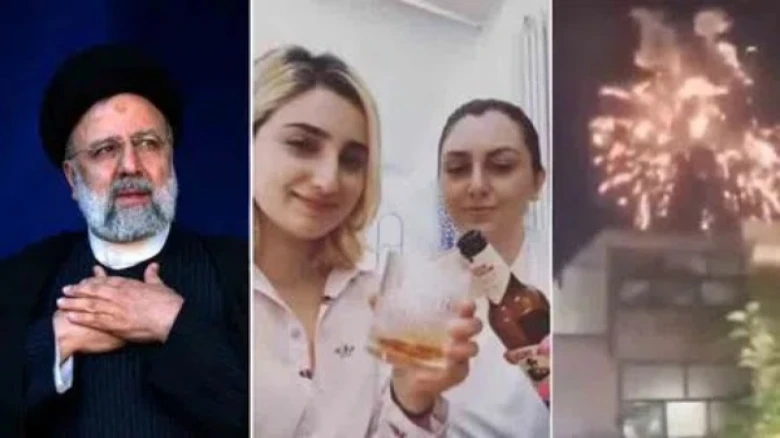Regional

The outpouring of joy at the news of his death symbolizes more than just the end of a controversial leader...
Digital Desk: “I think this is the only crash in history where everyone is worried if someone survived,” Iranian-American journalist Masih Alinejad wrote on X after reports emerged that a helicopter carrying President Ebrahim Raisi had crashed. "Happy World Helicopter Day!" the Iranian activist added.
While hundreds gathered in the main squares of Tehran and Mashhad to pray for the safety of President Ebrahim Raisi following reports of the helicopter crash, scores of videos and reports emerged showing Iranians celebrating the news. Many Iranians and Iranian expatriates on social media were seen joking and sharing memes about the crash. Celebratory fireworks lit up the night sky in Iran, captured in several videos.
But why this outburst of joy and celebration over the potential death of a national leader? And is the celebration just about Raisi, or is it emblematic of a fightback by people repressed by a theocratic state?
A Divided Response to Raisi’s Helicopter Crash
As many were glued to TV screens and smartphones for updates on the well-being of the Iranian President, many in Iran and abroad were seen rejoicing at the possibility of the death of 63-year-old Raisi, who is often referred to as the "Butcher of Tehran". Raisi was not only a symbol of Iran's extreme conservative turn after the Islamic Revolution of 1979 but also a key figure responsible for enforcing harsh measures against dissent and personal freedoms.
Ebrahim Raisi and the Moniker 'Butcher of Tehran'
Iranian President Ebrahim Raisi and Foreign Minister Hossein Amir-Abdollahian were among nine people confirmed dead after their chopper crashed in Iran's mountainous northwestern region. The reports of the helicopter crash triggered widespread celebrations across the Shia nation. Raisi had been in office since August 2021, ruling with an iron fist.
Known for his proximity to the Supreme Leader Ali Khamenei, Raisi was a hardliner in line to be Iran's next Supreme Leader. Raisi’s reputation as the "Butcher of Tehran" stems from his role in the 1988 mass execution of political prisoners. As the deputy prosecutor in Tehran, he was part of the 'death committee' responsible for summary trials and executions of thousands of political dissidents. According to Amnesty International, Iranian authorities secretly kidnapped and "extrajudicially executed" more than 5,000 people between July and September 1988.
Raisi Among Top Faces of Iran's Repressive Government
Iran has faced Western sanctions over its alleged military nuclear program, impacting the economy of Iran, the world's fifth-biggest petroleum producer. These sanctions, coupled with widespread bureaucratic corruption, woeful economic mismanagement, and high unemployment, have made the common people the worst sufferers.
Raisi’s presidency was marked by the enforcement of strict Islamic laws, such as the "hijab and chastity law", which gave unlimited powers to the morality police in Iran. This law triggered nationwide protests against the theocratic regime after the custodial death of Mahsa Amini in 2022. Amini was arrested by the morality police for not wearing a hijab, leading to one of the most significant challenges faced by the Iranian regime since the 1979 Iranian Revolution.
A Society in Flux
There is a massive shift in Iranian society, fueling the rage against the hardline Islamist government. A 2021 survey by the Group for Analysing and Measuring Attitudes in Iran (GAMAAN) revealed that 47% of Iranians have shifted from being religious to non-religious. This change reflects a broader dissatisfaction with the government's strict religious mandates and repression of personal freedoms.
The celebrations triggered by reports of Raisi’s death are indicative of a deeper discontent within Iranian society. Some on social media hinted at the possibility of the theocratic government being toppled. Carne Ross, a UK-based Green Party politician, tweeted, "It would be great if Raisi's death triggered the overthrow of the oppressive misogynist regime in Iran. The state apparatus appears strong, but remember that regimes that rule without consent, as East Germany demonstrated, are in fact incredibly fragile."
Regional and International Implications
Raisi’s presidency also saw Iran’s first direct attack on Israel. Iran, known for funding radical proxies like Hamas, Palestinian Islamic Jihad, Yemeni Houthis, and Lebanon-based Hezbollah, uses these groups to target the interests of the US and Israel in the region. The implications of Raisi’s death extend beyond Iran's borders, potentially impacting the geopolitical dynamics of the Middle East.
The celebrations in Iran that went through the night have prompted the Iranian government to react. The Islamic Revolutionary Guard Corps (IRGC) has been deployed at several places in Iran to "prevent an uprising". Those celebrating risked arrest, and even death, for acting against the hardline state, reflecting the simmering unrest and desire for change among the Iranian populace.
The crash of Raisi’s helicopter and the ensuing reactions highlight the profound divide within Iran. The outpouring of joy at the news of his death symbolizes more than just the end of a controversial leader; it represents the aspirations of a population yearning for freedom from an oppressive regime. As the dust settles, the world watches closely, aware that this moment might be a pivotal point in Iran's complex and turbulent history.
Leave A Comment